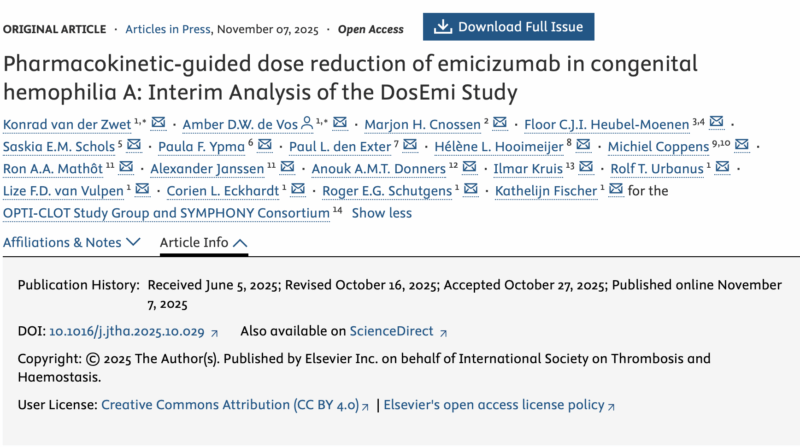
Wolfgang Miesbach Explores the DosEmi Study’s Interim Results on Emicizumab
Wolfgang Miesbach, Professor of Medicine at Frankfurt University Hospital, shared on LinkedIn:
”Cost-Effective Care Without Compromising Safety in Haemophilia!
The Dutch DosEmi study’s interim results demonstrate that reducing emicizumab doses by 39% maintains comparable bleeding control to conventional dosing.
The Challenge
Emicizumab has transformed haemophilia A management since its 2019 approval, offering subcutaneous administration and longer dosing intervals.
However, its high cost creates significant barriers to access, particularly in resource-limited settings.
Current label dosing results in plasma concentrations averaging 55 µg/mL, yet pharmacodynamic analyses suggest effectiveness at lower levels
The New Idea
This multicenter Dutch trial employed pharmacokinetic-guided dosing targeting trough concentrations of 30±5 µg/mL instead of the conventional 45 µg/mL.
Using validated PK modeling and Bayesian analysis, researchers provided personalized dosing recommendations through an online platform.
The Results
Among 26 adults with severe hemophilia A followed for six months:
- 69% remained bleed-free on conventional dosing vs. 58% on reduced dosing (statistically comparable)
- Joint bleed protection remained stable: 85% vs. 88% without joint bleeds
- Annualized bleeding rate stayed low: 0.7 vs. 0.9 bleeds/year
- Only one spontaneous muscle bleed occurred (at adequate drug levels)
Importantly, participants extended their dosing intervals from weekly/biweekly to biweekly/monthly injections—potentially reducing treatment burden, especially for children who experience injection-site pain.
The Clinical Impact
This is the first prospective crossover study validating PK-guided dose reduction in haemophilia A.
Unlike retrospective studies from lower-income countries showing effectiveness at ultra-low doses, this research was conducted in participants already on conventional prophylaxis with established bleeding control—making the findings directly applicable to clinical practice in high-income settings.
The study met all pre-specified safety criteria and has now expanded to include participants under 16 years.
Final results expected in 2027 could establish new treatment guidelines, making emicizumab accessible to more patients globally while maintaining the excellent safety profile that has made it a game-changer in hemophilia care.
As healthcare systems worldwide face increasing cost pressures, this research demonstrates that personalized, data-driven medicine can simultaneously improve patient outcomes and resource utilization.”
Read the full article in JTH.
Article: Pharmacokinetic-guided dose reduction of emicizumab in congenital hemophilia A: Interim Analysis of the DosEmi Study
Authors: Konrad van der Zwet, Amber D.W. de Vos, Marjon H. Cnossen, Floor C.J.I. Heubel-Moenen, Saskia E.M. Schols, Paula F. Ypma, Paul L. den Exter, Hélène L. Hooimeijer, Michiel Coppens, Ron A.A. Mathôt, Alexander Janssen, Anouk A.M.T. Donners, Ilmar Kruis, Rolf T. Urbanus, Lize F.D. van Vulpen, Corien L. Eckhardt, Roger E.G. Schutgens, Kathelijn Fischer on behalf of OPTI-CLOT Study Group and SYMPHONY Consortium

Stay updated on all scientific advances with Hemostasis Today.
-
Feb 22, 2026, 10:39Tagreed Alkaltham: Fibrinogen Concentrate Is a Deliberate Clinical Choice in Acute Bleeding
-
Feb 22, 2026, 09:38Abdulrahman Nasiri: Significant Shifts In The 2026 AHA/ACC Guidelines for Acute Pulmonary Embolism
-
Feb 22, 2026, 09:22Shiny K. Kajal: Not All Transfusion Reactions Are Immunohematologic Incompatibilities
-
Feb 22, 2026, 09:12Arun V J։ The Hidden Risks in Every Blood Bag
-
Feb 22, 2026, 08:56Parandzem Khachatryan։ How Hard Is It to Be a Mom, a Wife, a Professor, and a Doctor All at Once?
-
Feb 22, 2026, 08:46Anirban Sen Gupta Presents Bioinspired Platelet Surrogates at MTEC
-
Feb 22, 2026, 08:31Heghine Khachatryan: Advancing Care for Women and Girls with Bleeding Disorders is A Matter of Equity
-
Feb 22, 2026, 08:18Ossama Mansour: The Safety and Clinical Efficacy of Endovascular Therapy in TVAI
-
Feb 22, 2026, 07:46Vallabh Janardhan: Vascular Disease Is Sltimately A Story of Thrombosis

